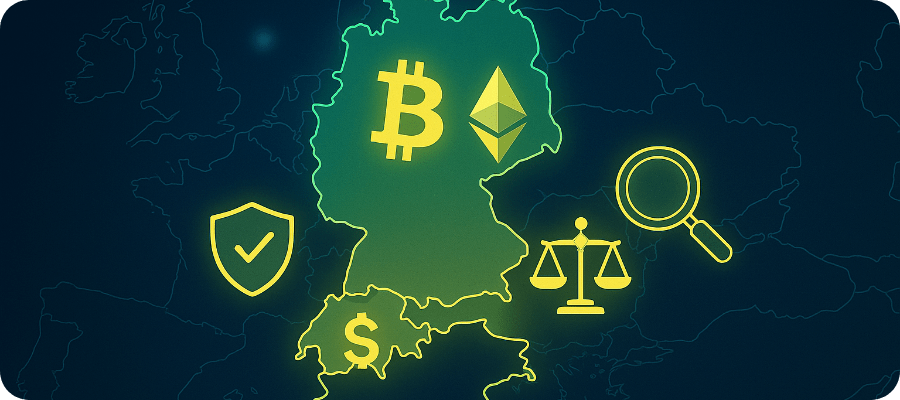[ez-toc]
The DACH region, comprising Germany (Deutschland), Austria (Österreich), and Switzerland (Confoederatio Helvetica), has emerged as a significant hub for cryptocurrency innovation and adoption in Europe. Each country within this economic powerhouse has developed its unique regulatory approach to digital assets, creating a complex landscape for investors, businesses, and consumers to navigate. As blockchain technology continues to evolve, understanding the regulatory framework across these three nations has become essential for anyone looking to participate in the crypto economy within Central Europe.
Germany: Leading with Clear Regulatory Frameworks
Germany has positioned itself as one of Europe’s most progressive nations regarding cryptocurrency regulation. The German government officially recognized Bitcoin and other cryptocurrencies as financial instruments in 2013, making it one of the first countries to provide legal clarity on digital assets.
The crypto industry in Germany has witnessed significant growth in recent years, with substantial investments flowing into blockchain startups and established financial institutions integrating digital asset services. Following the latest crypto news, Germany continues to refine its regulatory approach, balancing innovation with consumer protection and financial stability concerns.
BaFin (Federal Financial Supervisory Authority)
The Federal Financial Supervisory Authority (Bundesanstalt für Finanzdienstleistungsaufsicht, BaFin) serves as Germany’s primary regulatory body overseeing cryptocurrency activities. Since January 2020, crypto custody businesses must obtain licenses from BaFin, following the implementation of the Fifth Anti-Money Laundering Directive (AMLD5).
BaFin has established clear guidelines for cryptocurrency businesses, including comprehensive requirements for anti-money laundering procedures, risk management, and customer due diligence. These regulations have provided a structured environment for crypto businesses while maintaining Germany’s reputation for financial stability and consumer protection. More information about BaFin’s crypto regulations can be found on their official website.
German Federal Ministry of Finance (BMF)
The German Federal Ministry of Finance (Bundesministerium der Finanzen, BMF) plays a crucial role in shaping cryptocurrency taxation policies. In 2021, the BMF published comprehensive guidance on the tax treatment of cryptocurrencies, providing clarity on how digital assets should be reported for income tax purposes.
According to the BMF guidelines, cryptocurrencies held for more than one year are generally exempt from capital gains tax for individual investors, creating a favorable environment for long-term crypto investments. The ministry continues to refine these regulations as the crypto ecosystem evolves. You can access the BMF’s cryptocurrency tax guidelines through their official portal.
Austria: Embracing Innovation with Regulatory Caution
Austria has adopted a balanced approach to cryptocurrency regulation, seeking to foster innovation while ensuring adequate oversight. The Austrian Financial Market Authority (Finanzmarktaufsicht, FMA) oversees crypto-related activities, particularly focusing on anti-money laundering compliance and investor protection.
In 2020, Austria implemented the EU’s Fifth Anti-Money Laundering Directive, requiring cryptocurrency service providers to register with the FMA and comply with AML/KYC requirements. The country has shown openness to blockchain technology, with Vienna emerging as a significant hub for crypto startups.
Financial Market Authority (FMA)
The Financial Market Authority serves as Austria’s primary regulatory body for cryptocurrency oversight. The FMA has issued warnings about the risks associated with cryptocurrencies while simultaneously working to create a safe environment for legitimate businesses to operate.
Under current regulations, crypto service providers must register with the FMA and implement robust compliance programs, including customer identification procedures and suspicious transaction reporting. The FMA provides regulatory guidance through its official website, including specific information on virtual currencies and initial coin offerings.
Switzerland: The Crypto Valley
Switzerland has earned its reputation as “Crypto Valley,” particularly in the canton of Zug, where hundreds of blockchain companies have established operations. The Swiss Financial Market Supervisory Authority (FINMA) has developed a principles-based regulatory framework that has attracted numerous cryptocurrency projects and initial coin offerings.
The country’s pragmatic approach to regulation combines innovation-friendly policies with strict compliance requirements. In 2021, Switzerland implemented the blockchain law, providing clear legal foundations for trading rights through tokenized securities and the segregation of crypto assets in the event of bankruptcy.
Swiss Financial Market Supervisory Authority (FINMA)
FINMA has established itself as a forward-thinking regulator in the cryptocurrency space. The authority categorizes tokens into three categories: payment tokens, utility tokens, and asset tokens, with specific regulatory requirements for each classification.
FINMA requires cryptocurrency businesses to comply with anti-money laundering regulations and, depending on their activities, may need to obtain banking licenses or securities dealer authorizations. The regulator provides detailed guidance on its official website.
Conclusion
The DACH region represents one of the most developed cryptocurrency ecosystems in Europe, with each country taking a slightly different regulatory approach. Germany offers perhaps the most comprehensive framework with clear guidelines from BaFin and the BMF. Austria maintains a balanced approach focused on consumer protection, while Switzerland continues to cultivate its reputation as a global blockchain innovation hub.
For businesses and individuals looking to engage with cryptocurrencies in the DACH region, understanding these regulatory nuances is essential. As the blockchain industry continues to mature, we can expect further regulatory refinements aimed at fostering innovation while protecting consumers and maintaining financial stability across these three influential European economies.
